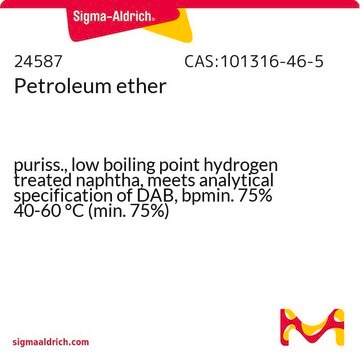87368
Tetrahydrofuran
≥99.9%, ACS reagent, contains ~0.025% 2, 6-di-tert-butyl-4-methylphenol as stabilizer, 250 ppm BHT as inhibitor, suitable for solid phase extraction (SPE), reag. Ph. Eur.
Synonym(s):
THF, Butylene oxide, Oxolane, Tetramethylene oxide
About This Item
Recommended Products
product name
Tetrahydrofuran, contains 250 ppm BHT as inhibitor, puriss. p.a., ACS reagent, reag. Ph. Eur., ≥99.9%
grade
ACS reagent
puriss. p.a.
Quality Level
Agency
reag. Ph. Eur.
vapor density
2.5 (vs air)
vapor pressure
114 mmHg ( 15 °C)
143 mmHg ( 20 °C)
Assay
≥99.9%
form
liquid
autoignition temp.
610 °F
contains
250 ppm BHT as inhibitor
~0.025% 2,6-di-tert-butyl-4-methylphenol as stabilizer
expl. lim.
1.8-11.8 %
technique(s)
solid phase extraction (SPE): suitable
impurities
≤0.001% free acid (as CH3COOH)
≤0.005% peroxides (as H2O2)
≤0.05% water
evapn. residue
≤0.001%
refractive index
n20/D 1.407 (lit.)
n20/D 1.407
pH
~7
bp
65-67 °C (lit.)
mp
−108 °C (lit.)
density
0.887 g/mL at 20 °C
0.889 g/mL at 25 °C (lit.)
cation traces
Al: ≤0.5 mg/kg
B: ≤0.02 mg/kg
Ba: ≤0.1 mg/kg
Bi: ≤0.1 mg/kg
Ca: ≤0.5 mg/kg
Cd: ≤0.05 mg/kg
Co: ≤0.02 mg/kg
Cr: ≤0.02 mg/kg
Cu: ≤0.02 mg/kg
Fe: ≤0.1 mg/kg
K: ≤0.5 mg/kg
Li: ≤0.1 mg/kg
Mg: ≤0.1 mg/kg
Mn: ≤0.02 mg/kg
Mo: ≤0.1 mg/kg
Na: ≤0.5 mg/kg
Ni: ≤0.02 mg/kg
Pb: ≤0.1 mg/kg
Sn: ≤0.1 mg/kg
Sr: ≤0.1 mg/kg
Zn: ≤0.1 mg/kg
SMILES string
C1CCOC1
InChI
1S/C4H8O/c1-2-4-5-3-1/h1-4H2
InChI key
WYURNTSHIVDZCO-UHFFFAOYSA-N
Looking for similar products? Visit Product Comparison Guide
Related Categories
General description
Application
It may be used for the dissolution of poly-ε-caprolactone (PCL) and 1,3-diaminopentane, during the preparation of poly-ε-caprolactone (PCL)-hydroxyapatite (HA) scaffolds and acrylate-terminated poly(5-amino-1-pentanol-co-1,4-butanediol diacrylate) (C32)- 1,3-diaminopentane (117) polymer, respectively.
Analysis Note
Other Notes
Go to our Greener Alternative-Cyclopentyl methylether - 675989
Signal Word
Danger
Hazard Statements
Precautionary Statements
Hazard Classifications
Acute Tox. 4 Oral - Carc. 2 - Eye Irrit. 2 - Flam. Liq. 2 - STOT SE 3
Target Organs
Respiratory system
Supplementary Hazards
Storage Class Code
3 - Flammable liquids
WGK
WGK 1
Flash Point(F)
-6.2 °F - closed cup
Flash Point(C)
-21.2 °C - closed cup
Certificates of Analysis (COA)
Search for Certificates of Analysis (COA) by entering the products Lot/Batch Number. Lot and Batch Numbers can be found on a product’s label following the words ‘Lot’ or ‘Batch’.
Already Own This Product?
Find documentation for the products that you have recently purchased in the Document Library.
Customers Also Viewed
Our team of scientists has experience in all areas of research including Life Science, Material Science, Chemical Synthesis, Chromatography, Analytical and many others.
Contact Technical Service








